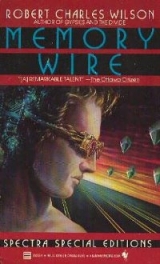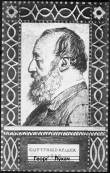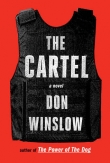
Текст книги "Memory Wire"
Автор книги: Robert Charles Wilson
Соавторы: Robert Charles Wilson
Жанры:
Научная фантастика
,сообщить о нарушении
Текущая страница: 14 (всего у книги 14 страниц)
CHAPTER 28
Lost between worlds, between the drone of the enkephalins and the electricity of the dreamstone, Teresa opened her eyes.
She saw Byron’s float shack. She recalled a similar shack, a long time ago. The man in the next room was named Oberg. The man in the next room might have been named Carlos.
She held the stone in her hand.
And if I look in the mirror, she thought giddily, I’ll see the shoes bound with dirty twine, the old denim open at the knees. It was the thing she had resisted, the thing she had feared, the vision that had haunted her since that day in the hotel room off the Ver-o-Peso.
She would fall into the mirror, tumble into history, turn back into herself.
The voice of the girl was inside her now, louder and more insistent than it had ever been. The voice was warning her that she would die, that the man with the gun would kill her, that she had to do something, do something now.
It was the voice that had sustained her through the fire, buoyed her up when she wanted to die, when she knew she deserved to die.
But death was not so tractable. Death had finally come to finish what he had begun. It was only an appointment she had missed a long time ago. She had been expecting it and maybe even—it was possible to admit this now—maybe even wanting it, wanting it for years. Searching for it in pill bottles, the peace of it, an end at last to this quarreling with herself…
No, the voice said.
And for a moment the memory overtook her. She felt the smoke stealing her breath, the heat of the fire behind her. Carlos was dead and Mama was dead and she should have died too: because she was not a good girl and never would be. It was the bedrock on which she had built herself, this guilt.
Be me, the voice insisted. Take me back. No, Teresa thought…
But then there was the splintering of wood in the kitchen, the table split and broken, Cruz Wexler throwing himself forward… and then the gunshot, Wexler bleeding on the floor… and the door opened, and it was Ray, he had come back, some miracle had brought him back, and her heart hammered, seeing him… but he was bloody and exhausted and Oberg had turned the gun on him now…
And so she relented: all right, yes, she thought, and in a motion that was not physical she embraced the little girl, gave herself wholeheartedly to the stone, felt time run back until she was young and whole and wanting desperately to live, for Ray to live, running toward Oberg (or Carlos) now, twine-bound sneakers on her feet and denim out at the knee, allowed at last to hate him, hating him with everything that was in her, screaming out to him this ancient, buried truth, that she was not bad, she was not bad, she was not.
CHAPTER 29
1. Seeing Teresa running from the back room—knowing that Oberg would kill her if he managed to swivel the gun—Keller summoned the last of his strength and leaped sideways.
He heard the crack of gunfire following him. He fell against the wall in an awkward crouch, unhurt but briefly helpless. Surely the next bullet would come soon. He lifted his face toward Oberg, exhausted beyond fear.
He saw Teresa stumble into the Agency man.
She moved oddly. Her eyes were wide; her face seemed curiously transformed. Like a child’s face, Keller thought.
The Pau Seco stone was in her left hand. With her right she touched Oberg.
She fell against him.
Oberg’s eyes were fixed on Keller, and in that moment Keller felt some of the horror that erupted from him. It was wounding, awesome…
“The gun,” Byron said, stumbling out of his chair. “Christ’s sake, Ray, get the gun!”
2. Oberg was taken by surprise.
He was leveling his weapon at Keller—who had hacked away his neural socket somehow, somehow tracked him here—when the woman rushed him from the back room.
He had sensed her approach and his arm was cocked to shove her away. It should not have been a problem. But the stone—
She touched him with the stone.
He felt it like a current through him.
It was like the time Tavitch had touched him. No, it was worse. He felt himself tumbling into memory, seconds stretching into minutes, everything slowed but his erupting guilt, a village in Brazil, bodies all around him but not dead: their pain and rage had survived them somehow, leaped at him now from this woman’s hand.
Blinking, he saw Keller stand up. Keller, a bloody apparition who should have died… and maybe had died: who might be another ghost, another stubborn corpse come to make its accusation.
Gap-jawed, Oberg stood helpless in a river of ancient hate.
He felt the gun slipping from his hand.
Teresa’s body pressed him against the wall of the shack. Her face hovered before him, transfigured with a kind of innocence he could hardly credit. In the world he inhabited, nothing like this existed. And it was another rebuke, luminous and terrible; he contorted away from her in a spasm of self-loathing.
Without warning, he understood the thing he was.
Monster, Ng had said.
The voice echoed down a twisted geometry from the gallows at Pau Seco. Monster. But it was true. He felt it in Teresa. She was unimpeachable, childlike, beyond lies. He withered in the fierce light of her hatred.
Screaming, he pushed her away.
The gun … but Keller had twisted the gun from his hand before he could raise it.
Oberg bolted through the open door.
3. Keller raised the gun to follow, but there wasn’t time to fire.
Panicked in the darkness, Oberg took two long strides toward the low chain-link fence and tumbled over it.
Keller ran out after him, blinking in the darkness. Dogs were barking; a few lamps had flickered on in the neighboring balsas.
He peered over the fence, down into the canal. Not yet dawn, but there was light enough to see Oberg’s body spread-eagled at the base of a concrete riser … to see the dark canal water rise up and claim him, to see the stain of Oberg’s blood washed into the slow swell, the rising and falling of the saltwater on this cold night.
A wind came off the tidal dam from the ocean. He turned to look for Teresa, and suddenly she was in his arms, the warmth of her against him, weeping.
CHAPTER 30
Later, after Wexler’s quiet funeral in the Floats, Byron figured it was time to leave.
He had talked it over with Teresa days earlier. They said private good-byes, he held her briefly. She said, “You don’t have to go.” But he did. Time to get back into the world.
She gave him the stone.
“I don’t need it,” she said, and the new look was on her face: a smile that was almost childlike. “I’ve been there.”
He walked with Keller a distance along the canal. It was a bright, clear day; the sky arched down to meet the hard angle of the sea. Byron shifted his duffel up his shoulder. Keller offered his hand.
Byron took it, though he saw Keller wince with the motion. “You all right?”
“Getting better.” Keller essayed a smile. “You have the stone?”
He nodded. It was in his bag.
He was not certain why he’d taken it. Only this feeling—an instinct—that it might be useful.
Strange, he thought. Wexler had spent his life searching among these stones for something alien, some higher wisdom, a way out of the world. But finally it wasn’t that. Byron had watched the change in Teresa since that night with Oberg in the float shack, some old brokenness healed. It was subtle, a lightness, the way she moved her eyes, but it was profound too; he had discovered he wasn’t afraid for her anymore. So it was not a way out of the world but a way into it.
All debts paid. “She’s doing all right.” He added, impulsively—a little wistfully—“Watch out for her, Ray, all right? Do that for me.”
Keller nodded.
He faced the mainland resolutely, but turned back a step later to take in Keller—Keller with his eyes full of old pain, Keller braced against a chain-link fence with one knee bent and the Floats rolling away behind him. He said, “You live here now.”
And maybe it was true.
Keller walked back along the margin of the canal. He felt again this curious lightness. His Angel wires, he thought, severed from their socket, withering and dying inside him. But more than that.
You live here now.
He climbed a chain-link riser and saw the ocean out beyond the tidal dam. The ocean was implacable, dark, vaster than he could compass; and memory was like that, he thought, not video memory but his own memory, of Meg, of Teresa, of Byron, of his life: wide and deep and mysterious beyond saying. It contained him more than he contained it, and it would not brook betrayal; but there were days, he thought, like this one, when the ocean stood calm and seemed to augur in its tides some bright millennium.
He went down the boardwalk to the ancient float shanty, Teresa in the doorway waiting for him, calm in the sunlight. A breeze from the seawall made him shiver; she held the door wider. “Better come in,” she said. “It’s cold out there.”








